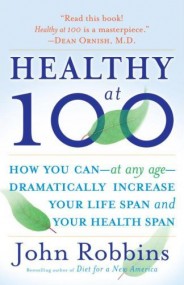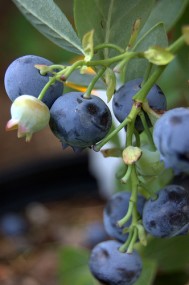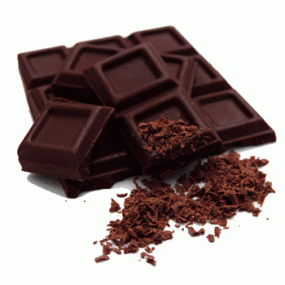- Fitness (19)
- News & Reviews (25)
- Nutrition (20)
- Science (10)
- Supplements (6)
- Technologies (8)
- The Arts (9)
Heart Dark Chocolate
February 22nd, 2011
 By John Robbins: There is a growing body of credible scientific evidence that chocolate contains a host of heart-healthy and mood-enhancing phytochemicals, with benefits to both body and mind.
By John Robbins: There is a growing body of credible scientific evidence that chocolate contains a host of heart-healthy and mood-enhancing phytochemicals, with benefits to both body and mind.
For one, chocolate is a plentiful source of antioxidants. These are substances that reduce the ongoing cellular and arterial damage caused by oxidative reactions.
You may have heard of a type of antioxidants called polyphenols. These are protective chemicals found in plant foods such as red wine and green tea. Chocolate, it turns out, is particularly rich in polyphenols. According to researchers at the University of Texas Southwestern Medical Center in Dallas, the same antioxidant properties found in red wine that protect against heart disease are also found in comparable quantities in chocolate.
How does chocolate help to prevent heart disease? Continue reading »
Filed under Nutrition | Comments Off on Heart Dark ChocolateYour Brain on Blueberries
January 16th, 2011
 From Scientific American: Chemical compounds common to berries, tofu, tea and other foods can shore up memory and boost brainpower.
From Scientific American: Chemical compounds common to berries, tofu, tea and other foods can shore up memory and boost brainpower.
What is blue, sweet and juicy and may help ward off those nagging memory lapses? If you guessed blueberries, you would be right… they may protect our brain.
Emerging research suggests that compounds in blueberries known as flavonoids may improve memory, learning and general cognitive function, including reasoning skills, decision making, verbal comprehension and numerical ability. In addition, studies comparing dietary habits with cognitive function in adults hint that consuming flavonoids may help slow the decline in mental facility that is often seen with aging and might even provide protection against disorders such as Alzheimer’s and Parkinson’s.
To date, scientists have identified more than 6,000 flavonoid-containing foods. They are widely distributed in fruits and vegetables, cereal grains, cocoa, soy foods, tea and wine.
How much do we need? A Cincinnati study found a 30% improvement in a group of adults older than 75 with mild memory loss who drank two cups of blueberry juice a day (the equivalent of five cups of blueberries). One study in England asked peope to add flavonoid containing foods to their meals: either soy products, supplements (Gingko biloba or pine bark extract) or a cocoa-containing beverage. Flavonoid consumption improved cognition and fine motor skills. Amounts needed to produce the improvements? One and a half cups of tofu or two cups of soy milk, 120 mg. of gingko, 150 mg. of pine bark extract, or 172 mg of cocoa flavonoids (the equivalent of 10.5 ounces of dark chocolate).
But wait–these studies give single-source quantities! If you have flavonoids from a variety of sources you’ll need moderate amounts of each one. The bottom line: eat your fruits and vegetables!
Article (behind a paywall)
Filed under News & Reviews, Nutrition | Comments Off on Your Brain on BlueberriesReversing Heart Disease
September 24th, 2010
.
Bill Clinton explained in an interview with CNN’s Wolf Blitzer that his recent weight loss was an unintended side effect of the mostly plant-based diet he’s adopted in a bid to reverse his heart disease.
Former President Clinton revealed that the grafted vein from his heart bypass surgery had started clogging up with cholesterol. Concerned, he read several books, including Prevent and Reverse Heart Disease by Caldwell Esselstyn, M.D., Dr. Dean Ornish’s Programme for Reversing Heart Disease, and The China Study by researchers T. Colin Campbell and Thomas M. Campbell II.
Mr. Clinton was convinced that the scientific research is converging on the notion that a plant-based diet can not only prevent, but actually reverse coronary heart disease.
Filed under Nutrition | Comments Off on Reversing Heart DiseasePavlov’s Dessert Cart
September 12th, 2010
 Podcast by Christopher Intagliata: Bookshops and DVD stores are closing up. No surprise, because who would pay more at the store when you can get it cheaper online? A bunch of Caltech undergrads, that’s who.
Podcast by Christopher Intagliata: Bookshops and DVD stores are closing up. No surprise, because who would pay more at the store when you can get it cheaper online? A bunch of Caltech undergrads, that’s who.
Researchers found that the students were willing to pay 50 percent more for just about anything—DVD’s but also potato chips, Snickers bars, mugs—as long as the item was in front of them, as opposed to just the item’s image or text description. That study appears in the American Economic Review. [Benjamin Bushong et al.]
The researchers thought some sort of Pavlovian response might be at play—even though they didn’t just test with foods—because they say seeing a trinket or a snack within reach makes you want to grab it and handle it or eat it. So they showed candy and chips to the subjects once more, but out of reach behind plexiglass. Under those conditions, the students’ desire for the snacks diminished, as if they’d merely seen an image or description.
So next time you’re stuffed and the waiter wheels around the dessert cart, know that the odds are against you. Just cross your fingers that the chocolate cake’s under a glass dome, to help you resist the urge.
Filed under Nutrition | Comments Off on Pavlov’s Dessert CartDark Chocolate Health Benefits
September 2nd, 2010
 By Alexis Wolfer: The New York Times [has] reported that chocolate, in moderation is good for your heart. In fact, women (from Sweden in this study) who ate 1 to 2 servings of dark chocolate (between two-thirds of an ounce and one ounce) each week had almost one-third fewer cases of heart failure than those who avoided the sweet stuff. They say that chocolate may lower blood pressure and that the flavonoids in cocoa may reduce blood vessel inflammation.
By Alexis Wolfer: The New York Times [has] reported that chocolate, in moderation is good for your heart. In fact, women (from Sweden in this study) who ate 1 to 2 servings of dark chocolate (between two-thirds of an ounce and one ounce) each week had almost one-third fewer cases of heart failure than those who avoided the sweet stuff. They say that chocolate may lower blood pressure and that the flavonoids in cocoa may reduce blood vessel inflammation.
2010 was a good year for dark chocolate lovers — the news is full of promising research regarding its effects on heart, stress, brain & liver, not to mention tastebuds! — Dr. Cathie
BeautyBean … New York Times … Telegraph (UK) ... Daily Mail (UK) … Medical News Today
Filed under Nutrition | Comments Off on Dark Chocolate Health Benefits



